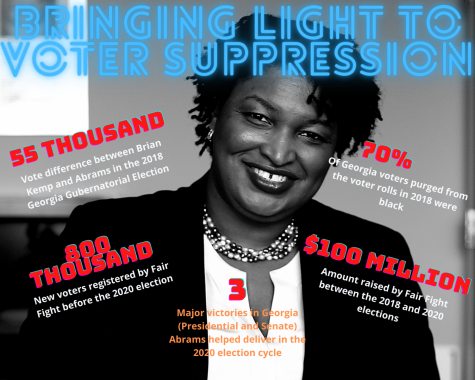Stacey Abrams’ Fair Fight to Combat Voter Suppression
February 23, 2021

After a grueling 2018 campaign that garnered national attention, Stacey Abrams fell short against Republican Brian Kemp in the Georgia gubernatorial election. The closest governor’s election in Georgia since 1966 was clouded by voter suppression that disproportionately affects minorities, a group that often favors Democratic candidates, leading up to and during the election. Now, just two years after that sour defeat, Georgia is “Stacey Abrams country” as said on Saturday Night Live, as Abrams’ work helped Joe Biden and both Democratic Senate candidates win their respective races.
Abrams began her career in public service as a member of the Georgia state House of Representatives in 2007 before becoming the minority leader four years later. By becoming the Democratic nominee for governor in 2018, she made history as the first African-American woman in the U.S. to be a major party nominee for governor. Throughout her campaign, she prioritized energizing minorities, making the race very competitive. Yet she could not overcome the voter roll purges, long poll lines, and other controversies surrounding the election, as she lost by 55 thousand votes to Kemp. Despite her apparent loss, she initially refused to concede.
“Pundits and hyper partisans will hear my words as a rejection of the normal order,” Abrams said, 10 days after election day. “You see, I’m supposed to say nice things and accept my fate. They will complain that I should not use this moment to recap what was done wrong or to demand a remedy. You see, as a leader I should be stoic in my outrage and silent in my rebuke. But stoicism is a luxury and silence is a weapon for those who would quiet the voices of the people. And I will not concede because the erosion of our democracy is not right.”
Although she did eventually concede to an extent, it was clear Abrams was here to stay in the political universe. The voter suppression that sunk her hopes of becoming governor drove her to create Fair Fight, an organization that focuses on voter registration, ballot access, and voter counting.
“I believe when there is a fair fight, when people are not only given the ostensible right to vote, but the right to vote is made real, we will win more and more elections,” Abrams said when speaking about her organization.
Throughout the 2020 presidential campaign, Abrams made it abundantly clear she wanted to be selected to be the Vice Presidential nominee to the Democratic candidate. The constant knock on her resume was the fact that she never held a major elected office, whether that be the governorship or a seat in Congress. Yet although this is still true, Abrams can definitely take credit for helping to flip Georgia blue this election cycle.
Fair Fight was responsible for registering approximately 800 thousand new voters in Georgia and raising over $100 million in just about two years. The work of Abrams was crucial to Biden winning the state’s 16 presidential electoral votes, and Biden took notice.
“And what about the one and only Stacey Abrams?” Biden said at a December 15 campaign in advance of the Senate runoffs. “And is there anyone in America who has done more to protect the right to vote in this election, is there anyone who’s done more to make sure the voice of every Georgian is heard? I don’t think so! Stacey Abrams you’re a hero. You’re the one that got this going. And we all thank you.”
What’s next for Stacey Abrams? Many are speculating towards a 2022 rematch against Kemp for the Georgia governorship. When asked about a potential redemption run by news outlets, Abrams has skirted the question without a definitive answer, but Republicans are already planning on her running. A political action committee (PAC) titled “Stop Stacey” was created February 1 by Kemp’s allies, including former Sen. Kelly Loeffler.
“We will do whatever it takes to expose Stacey Abrams’ radical network, highlight her dangerous agenda and ultimately defeat her—and her left-wing candidates—at the ballot box,” Jeremy Brand, the PAC’s senior strategist, said.
While the country is still fresh off a long campaign cycle, Republicans are already preoccupied with the threat of Abrams to the Georgia governorship. Many political experts like Abrams’ chances in 2022.
“She’s extremely important,” Georgia State University political scientist Robert M. Howard said in advance of the January Senate runoffs. “Abrams is the most powerful political figure in the Democratic Party in Georgia. Clearly she’s the leader of the party and has star power.”



Ellen Brown • Feb 26, 2021 at 3:02 pm
Excellent article about an amazing, rising star. Stacy is smart, organized and a powerhouse of both the present and future of Georhia. Go Josh Bc Brown and go Stacy Abrsms. Bright things ahead for both!